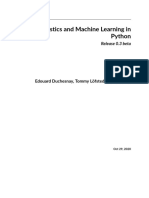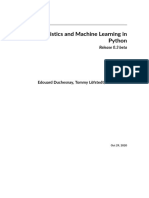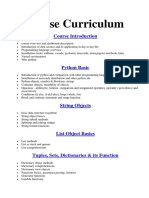0 ratings0% found this document useful (0 votes)
76 viewsPython for Machine Learning (1)
Uploaded by
hammadthecoderCopyright
© © All Rights Reserved
We take content rights seriously. If you suspect this is your content, claim it here.
Available Formats
Download as PDF, TXT or read online on Scribd
0 ratings0% found this document useful (0 votes)
76 viewsPython for Machine Learning (1)
Uploaded by
hammadthecoderCopyright
© © All Rights Reserved
We take content rights seriously. If you suspect this is your content, claim it here.
Available Formats
Download as PDF, TXT or read online on Scribd
You are on page 1/ 3
e-Rozgaar Center
Institute of Education and Research
University of the Punjab
Lahore
Program: Python for Machine Learning
Course Title: Python for Machine Learning Course Type: Technical
Duration: 3 Months
Prerequisites FA/FSc /ICom/ICS/DAE/A-Level or equivalent qualification and above
Introduction The purpose of this course is to give the students a hand on training of
implementation of machine learning models using python and its libraries. This
course will enable the participants to be able to get skills to either get job
related to machine learning or help in their academic projects.
Machine learning is an extremely important field used in many areas of
business analysis, data analysis, artificial intelligence, robotics and in several
statistics related fields. This training will help trainees in kick starting their
career in lucrative field of machine learning
Learning Objectives After the successful course completion students will be able to:
● Learn and understand the Python language.
● Implement machine learning models.
● Load data into Python.
● Perform data analysis on a given problem.
● Fine tune models using machine learning techniques.
● Present data in understandable form to extract results.
● Learn about freelancing and different online websites for freelancing.
o Fiverr
o Upwork
o Freelancer.com
● Be able to optimize their profile and get projects on freelancing
websites.
Course Contents Topic & Contents
1. Python Introduction
1.1. Introduction to Python
1.2. Setting up the python environment
1.3. Anaconda Installation
1.4. Py-Charm and Juypter Notebook
1.5. Basic syntax for Python
1.6. Variables and Data Type in python
1.7. Machine Learning Introduction
1.8. Assignment 1 Basic Data type strings and numbers
2. Data in Python
2.1. Lists and list comprehension in Python
2.2. Dictionary and Tuple in Python
2.3. Set in Python
2.4. Training and Test Set
2.5. Regression
2.6. Logistic Regression
2.7. Decision Trees
2.8. Assignment
2.9. Create Full frontend for a Website
3. Control flow in Python
3.1. Loops in Python
3.2. Conditionals in python
3.3. Lambda expression
3.4. Map Zip Enumerate
3.5. File Handling
3.6. Over-fitting Under-fitting and Generalization
3.7. KNN
3.8. Random Forest
3.9. Quiz 1
4. Numpy
4.1. Introduction to Numpy
4.2. Numpy function
4.3. Arrays in numpy
4.4. Cross Validation
4.5. K splits
4.6. Assignment
5. Data Visualization in Python
5.1. Matplotlib library
5.2. Seaborn library
5.3. Feature Engineering
5.4. Regression vs Classifiers
6. Panda Library
6.1. Introduction to Panda Library
6.2. Manipulating Data Frames
6.3. Loading Datasets
6.4. Clustering
7. SkLearn Library
7.1. Building a simple model using SkLearn
7.2. Implementing ML models
7.3. Random Forest
7.4. Hyper heuristics
8. Algorithm Chains and Pipelines
8.1. Cross Validation and its techniques
8.2. Gird Searching and Pipelines
8.3. Minimizing Error
9. Freelancing topics
9.1. Optimizing Fiverr Gigs
9.2. Introduction to Freelancer.com
9.3. Creating Profile in Freelancer.com
9.4. Creating Profile in Upwork.com
9.5. Writing a Cover letter
9.6. How to bid on projects
9.7. Different tools in Freelancing
9.8. Project Delivery and Deadlines
9.9. Art of Upselling
9.10. LinkedIn Profile optimization
9.11. How to win direct clients
9.12. Creating profile in PeoplePerHour.com
Textbooks “Hands-On Machine Learning with Scikit-Learn 2019” Aurélien Géron
Suggested Readings https://www.geeksforgeeks.org/machine-learning-with-python/
Teaching/Learning ● Lectures
Strategies ● Class discussion on all topics
● Multimedia
● PowerPoint Slides
● Hands-on Practice
Course Activities ● Quizzes
● Assignments
● Projects
● Daily Hands-on Practice
Evaluation Criteria Assignment will be submitted on Google Classroom portal for assessment.
Late assignments will not be accepted.
Grades are weighted according to the following scale:
20%-- Quizzes (5+5)
30%-- Mid
20%-- Project
30%-- Final Evaluation
100%-- Total
Training Mode Physical-Face to Face
Fee Rs. 19,000/- Course Fee
Rs. 1,000/- Registration Fee
You might also like
- 202046702 Artificial Intelligence and Machine LearningNo ratings yet202046702 Artificial Intelligence and Machine Learning4 pages
- Machine Learning Course Content For Classroomdocx - 240504 - 163403No ratings yetMachine Learning Course Content For Classroomdocx - 240504 - 1634036 pages
- Machine Learning With Python and ProjectNo ratings yetMachine Learning With Python and Project1 page
- Shi008 Booklet 80hours Machine Learning Using Python 082022No ratings yetShi008 Booklet 80hours Machine Learning Using Python 0820229 pages
- Gujarat Technological University: W.E.F. AY 2018-19No ratings yetGujarat Technological University: W.E.F. AY 2018-193 pages
- Python Machine Learning with AI Training SyllabusNo ratings yetPython Machine Learning with AI Training Syllabus3 pages
- Python - Follow Dr. AngShu (@drangshu) For More100% (1)Python - Follow Dr. AngShu (@drangshu) For More300 pages
- 4 Weeks Machine Learning and Artificial IntelligenceNo ratings yet4 Weeks Machine Learning and Artificial Intelligence3 pages
- Python for AI: Applying Machine Learning in Everyday ProjectsFrom EverandPython for AI: Applying Machine Learning in Everyday ProjectsNo ratings yet
- Big Data Machine Learning Prodegree EbrochureNo ratings yetBig Data Machine Learning Prodegree Ebrochure6 pages
- Statistics and Machine Learning in PythonNo ratings yetStatistics and Machine Learning in Python300 pages
- Statistics Machine Learning Python DraftNo ratings yetStatistics Machine Learning Python Draft319 pages
- Machine Learning: Ummer Ndustrial Raining RogramNo ratings yetMachine Learning: Ummer Ndustrial Raining Rogram7 pages
- Machine Learning Specialization CloudxLab PDFNo ratings yetMachine Learning Specialization CloudxLab PDF12 pages
- Intellipaat Python Certification Training Course Converted 3No ratings yetIntellipaat Python Certification Training Course Converted 311 pages
- EContent_7_2025_01_31_11_08_21_01IT0610pdf__2023_12_17_20_26_49pdf__2025_01_16_07_59_27No ratings yetEContent_7_2025_01_31_11_08_21_01IT0610pdf__2023_12_17_20_26_49pdf__2025_01_16_07_59_273 pages
- PACE 2.0 Syllabus Machine Learning With Python ProgramNo ratings yetPACE 2.0 Syllabus Machine Learning With Python Program18 pages
- Machine Learning Engineer Course Curriculum PDFNo ratings yetMachine Learning Engineer Course Curriculum PDF40 pages
- Python for Machine Learning: From Fundamentals to Real-World ApplicationsFrom EverandPython for Machine Learning: From Fundamentals to Real-World ApplicationsNo ratings yet
- Python for Engineers: Solving Real-World Technical ChallengesFrom EverandPython for Engineers: Solving Real-World Technical ChallengesNo ratings yet
- A Review On Predicting Students Performance UsingNo ratings yetA Review On Predicting Students Performance Using10 pages
- A Survey Paper On Classification of Fruits: Roshani - Raut@pccoepune - or G Pawarsakshi2703@gmaNo ratings yetA Survey Paper On Classification of Fruits: Roshani - Raut@pccoepune - or G Pawarsakshi2703@gma6 pages
- Credit Card Fraud Detection Using A Deep Learning Multistage ModelNo ratings yetCredit Card Fraud Detection Using A Deep Learning Multistage Model26 pages
- RapidMiner Data Mining Use Cases and Business Analytics Applications 1st Edition Markus Hofmann instant downloadNo ratings yetRapidMiner Data Mining Use Cases and Business Analytics Applications 1st Edition Markus Hofmann instant download76 pages
- 7.B.Tech CSE 7th Sem Lession Plan UEMJ PDFNo ratings yet7.B.Tech CSE 7th Sem Lession Plan UEMJ PDF117 pages
- IET Networks - 2022 - Wang - Parametric design method of building structured cabling system oriented to data miningNo ratings yetIET Networks - 2022 - Wang - Parametric design method of building structured cabling system oriented to data mining14 pages
- Instant ebooks textbook Artificial Intelligence in Financial Markets: Cutting Edge Applications for Risk Management, Portfolio Optimization and Economics 1st Edition Christian L. Dunis download all chapters100% (4)Instant ebooks textbook Artificial Intelligence in Financial Markets: Cutting Edge Applications for Risk Management, Portfolio Optimization and Economics 1st Edition Christian L. Dunis download all chapters62 pages
- Guru Nanak Dev Engineering College, LudhianaNo ratings yetGuru Nanak Dev Engineering College, Ludhiana48 pages
- 17 Ensemble Techniques Problem StatementNo ratings yet17 Ensemble Techniques Problem Statement28 pages
- Diet Recommendation System Based On Different Machine Learners A ReviewNo ratings yetDiet Recommendation System Based On Different Machine Learners A Review6 pages
- Proactive Collections Management: Using Artificial Intelligence To Predict Invoice Payment Dates By: Sonali NandaNo ratings yetProactive Collections Management: Using Artificial Intelligence To Predict Invoice Payment Dates By: Sonali Nanda22 pages
- Predicting Travel Insurance Purchases in An InsuraNo ratings yetPredicting Travel Insurance Purchases in An Insura16 pages
- Smart Glove For Hearing-Impaired: Abhilasha C Chougule, Sanjeev S Sannakki, Vijay S RajpurohitNo ratings yetSmart Glove For Hearing-Impaired: Abhilasha C Chougule, Sanjeev S Sannakki, Vijay S Rajpurohit5 pages
- Analytical Methods of Machine Learning Model For E-Commerce Sales Analysis and PredictionNo ratings yetAnalytical Methods of Machine Learning Model For E-Commerce Sales Analysis and Prediction6 pages
- Heart Diseases Prediction Using Deep Learning Neural Network ModelNo ratings yetHeart Diseases Prediction Using Deep Learning Neural Network Model5 pages
- Scientific Computation 1st Edition Gaston H. Gonnet All Chapters Instant Download100% (7)Scientific Computation 1st Edition Gaston H. Gonnet All Chapters Instant Download71 pages

























































































